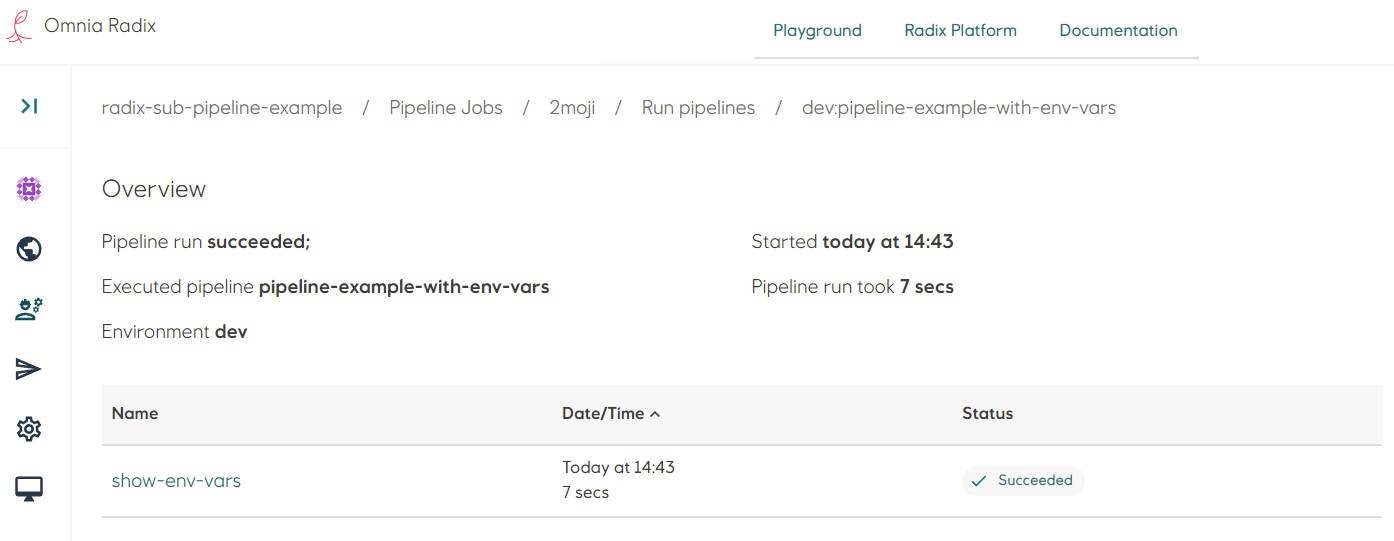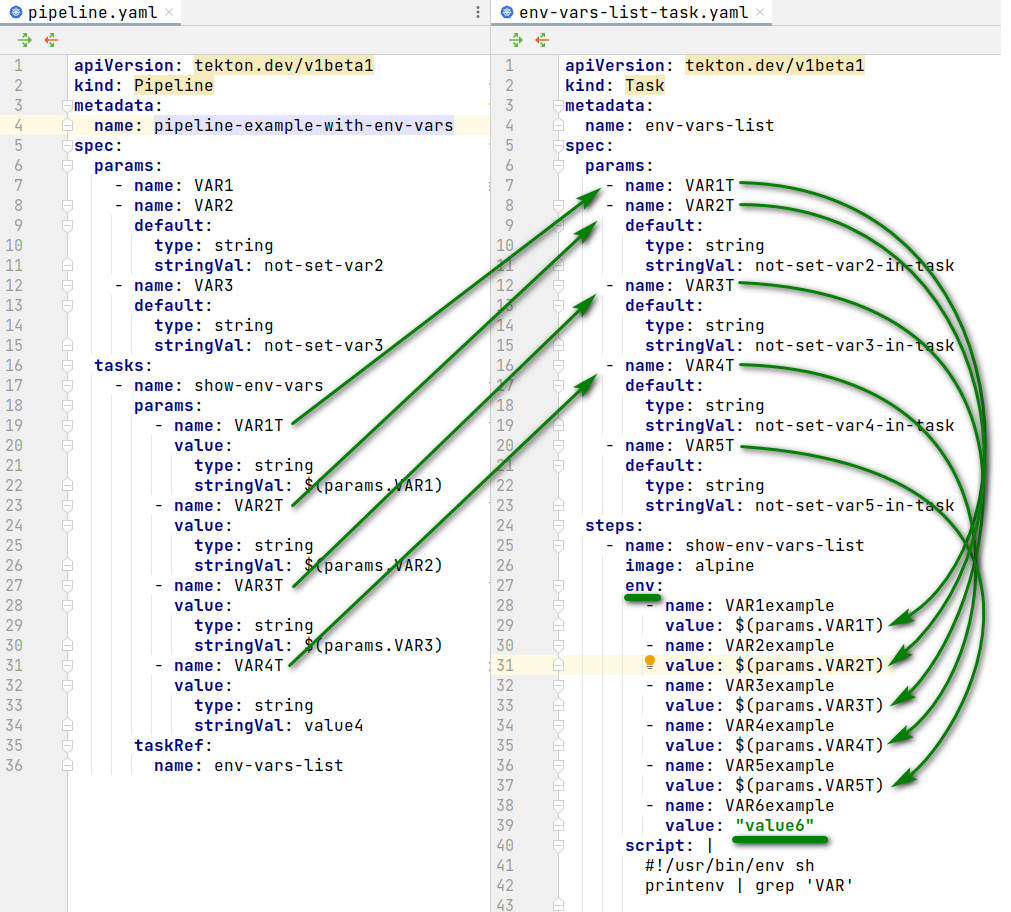Sub-pipeline example: Pipeline with environment variables
-
In the Radix application repository create a folder
tekton. This folder need to be in the configuration branch and in the same folder, whereradixconfig.yamlfile is located (by default it is a root of the repository). -
The sub-pipeline in this example runs one task.
-
Create a file
env-vars-list-task.yamlfor the taskenv-vars-list. This task has one step "show-env-vars-list", which runs in the container with Alpine Linux.- The step runs a script with one command
printenv | grep 'VAR'- show a list of the step's container environment variables, with names containing "VAR". - The task has input parameters in the field
params - The task step has description of environment variables in the field
env, which will be created in the step's container. These environment variables can get values from parameters, referencing to them with$(params.PARAM_NAME)or explicitly set with a value. - In the task below - there is parameters with names
VAR1T,VAR2T,VAR3T(names not necessary have to be in capital letters).- Actual parameter values are set in the sub-pipeline, which use the task, like arguments of a method in programming languages
VAR1T- this parameter does not have default value, so it has to be set in the sub-pipeline, otherwise there will be an error "missing parameters". Whentypeof a parameter is not set, it is astring.VAR2T,VAR3T,VAR4T,VAR5T- these parameters have default values. Fielddefaultallows to specify a value, used when the param is not passed from a sub-pipeline. Available types arestringandarray. When type isstring- default value should be put as a string value, when type isarray- default value should be put as an array of items lead by a dash, an additional fieldtypeneed to be set asarray:type: array.
apiVersion: tekton.dev/v1
kind: Task
metadata:
name: env-vars-list
spec:
params:
- name: VAR1T #it must be set in a sub-pipeline's task params, because it does not have default value
- name: VAR2T #it can be set in a sub-pipeline's task params, if not - used default "not-set-var2-in-task"
default: not-set-var2-in-task
- name: VAR3T #it can be set in a sub-pipeline's task params, if not - used default "not-set-var3-in-task"
default: not-set-var3-in-task
- name: VAR4T #it can be set in a sub-pipeline's task params, if not - used default "not-set-var4-in-task"
default: not-set-var4-in-task
- name: VAR5T #it can be set in a sub-pipeline's task params, if not - used default "not-set-var5-in-task"
default: not-set-var5-in-task
steps:
- name: show-env-vars-list
image: alpine
env:
- name: VAR1example
value: $(params.VAR1T) #set by parameter VAR1T
- name: VAR2example
value: $(params.VAR2T) #set by parameter VAR2T
- name: VAR3example
value: $(params.VAR3T) #set by parameter VAR3T
- name: VAR4example
value: $(params.VAR4T) #set by parameter VAR4T
- name: VAR5example
value: $(params.VAR5T) #set by parameter VAR5T
- name: VAR6example
value: "value6" #set explicitly with the value "value6"
script: |
#!/usr/bin/env sh
printenv | grep 'VAR' - The step runs a script with one command
-
Create a file
pipeline.yaml. Add a task in thetaskslist: give it a name (it can be any name, unique within this sub-pipeline), in the propertytaskRef("reference to a task") put the value from the propertymetadata.nameof the task, created above:
apiVersion: tekton.dev/v1
kind: Pipeline
metadata:
name: pipeline-example-with-env-vars
spec:
params:
- name: VAR1 #it must be set in the radixconfig.yaml
- name: VAR2 #it can be set in the radixconfig.yaml, if not - used default "not-set-var2"
default: not-set-var2
- name: VAR3 #it can be set in the radixconfig.yaml, if not - used default "not-set-var3"
default: not-set-var3
tasks:
- name: show-env-vars #name of the task "env-vars-list" in this sub-pipeline
params:
- name: VAR1T #set by parameter VAR1, from the radixconfig.yaml
value: $(params.VAR1)
- name: VAR2T #set by parameter VAR2, from the radixconfig.yaml or used default "not-set-var2"
value: $(params.VAR2)
- name: VAR3T #set by parameter VAR3, not set in the radixconfig.yaml - used default "not-set-var3"
value: $(params.VAR3)
- name: VAR4T #set explicitly with the value "value4"
value: value4
taskRef:
name: env-vars-list #task name
In Tekton documentation and examples params items have fields value and default, assigned directly with strings, not with objects, which is not correspond to the API specification. Currently, Radix strictly follows thes specification.
- File structure can be like this:
/
├── tekton/
│ ├── pipeline.yaml
│ └── env-vars-list-task.yaml
└── radixconfig.yaml
- In the file
radixconfig.yamladd a fieldbuildwith sub-fieldvariableswithin thesubPipelineoption. Values of these variables will be passed to the sub-pipeline parameters, which have the same name:VAR1- mandatory variable, passed to the sub-pipeline's parameterVAR1VAR2- optional variable, passed to the sub-pipeline's parameterVAR2. If it does not exist in theradixconfig.yaml, the sub-pipeline parameterVAR2will get a value, specified in itsdefaultfield.VAR100- unnecessary variable, not used in the sub-pipeline, it will be not passed to the sub-pipeline parameters.
spec:
build:
subPipeline:
variables:
VAR1: value1 #it must be set, as it is expected by the sub-pipeline
VAR2: value2 #it can be set, if it does not exist - the sub-pipeline will set default value
VAR100: value100 #it is not used in the sub-pipeline and its tasks
This sub-pipeline runs the task show-env-vars (which reference to the task env-vars-list described in the file env-vars-list-task.yaml), which has one step, as described above. This step run a script, printing environment variables, which names contain text VAR
#!/usr/bin/env sh
printenv | grep 'VAR'
First line of the script is shebang. It is recommended to use for consistent script behaviour. It can refer to a default shell sh or to a specific shell, existing in the step's image distribution, like bash for Ubuntu:
#!/usr/bin/env bash
-
Commit changes in the repository. Look at the details of a started Radix pipeline job (if the Radix app is connected to the GitHub WebHook, otherwise - start a job manually).
-
Navigate to the Radix pipeline step "Run pipeline", when it is running or completed: the pipelines overview page shows a table with a list of sub-pipelines - in this example it is one sub-pipeline "pipeline-example-with-env-vars", running for an environment "dev", and the sub-pipeline status.

-
Navigate to the sub-pipeline (click on its name in the table row)
-
The sub-pipeline overview page shows a table with a list of this sub-pipeline's tasks - in this example it is one task "env-vars-list", and the task status.

-
Navigate to the task (click on its name in the table row)
-
The sub-pipeline task overview page shows a table with a list of this task's steps - in this example it is one step "show-env-vars-list", the step status and log.
 The log shows environment variables of the step container:
The log shows environment variables of the step container:VAR1example=value1
VAR2example=value2
VAR3example=not-set-var3
VAR4example=value4
VAR5example=not-set-var5-in-task
VAR6example=value6VAR1exampleandVAR2example- these variables are set with values from theradixconfig.yaml, fieldbuild.variables. None of other task step environment variables are set in theradixconfig.yaml.
build:
subPipeline:
variables:
VAR1: value1
VAR2: value2VAR3example- this variable gets its default value fom sub-pipeline'sparamsfield
spec:
params:
- name: VAR3
default: not-set-var3VAR4example- this variable is set explicitly in the sub-pipeline, in the taskparams
tasks:
- name: show-env-vars
params:
- name: VAR4T
value: value4VAR5example- this variable is not defined in the sub-pipeline's taskparams, it is set to its default value, specified in the task
spec:
params:
- name: VAR5T #it can be set in a sub-pipeline's task params, if not - used default "not-set-var5-in-task"
default: not-set-var5-in-taskVAR6example- this variable is not defined in the sub-pipeline's taskparamsand task'sparams, it is set implicitly in the task step's fieldenv
steps:
- env:
- name: VAR6example
value: "value6"
